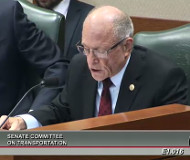3/21/2019
Texas Senator Bob Hall Kills Red Light Camera BanTexas state senator moves to block House effort from banning red light cameras.

The red light camera ban that gained the support of a veto-proof majority in the state House of Representatives was gutted on Wednesday by the Senate Transportation Committee. State Senator Bob Hall (R-Edgewood) introduced a committee substitute for his version of the bill that ensures any city that wishes to continue using cameras can continue doing so indefinitely.
"I was all for this bill until Senator Hall laid out the committee substitute," Arlington resident Kelly Cannon testified. "So I'm changing my stance to 'against' this bill. It's deja vu, 2017 all over again."
In 2017, Hall similarly used an amendment to turn a ban bill into a measure allowing Texas schools to use school buses as a platform for issuing automated tickets. Although the underlying bill did not pass, it encouraged the school bus photo ticketing company that went on to bankrupt Dallas County Schools and led to the felony conviction of five politicians and school officials.
On Wednesday, Hall opened his testimony by speaking out against the use of automated ticketing on the grounds of constitutionality and effectiveness. He pointed out that the machines issue tickets for split-second violations, when accidents occur several seconds after the light turns red. Then he introduced a substitute bill containing a grandfather clause that allows every local jurisdiction that currently uses cameras to issue tickets until the expiration date of the contract.
When a similar ban was threatened a decade ago, cities locked in deals lasting twenty years or more. To take advantage of the grandfathering loophole, cities would also need to jettison force majeure clauses, which would mean future city councils would not be able to cancel the use of red light cameras or even change vendors without paying a massive financial penalty. This is exactly what Houston did when it attempted to avoid House Bill 300 in 2009. American Traffic Solutions (now Verra Mobility) attorney Andy Taylor explained this during federal court proceedings.
"The city, fearful of HB300, did not want to be forced to terminate the agreement upon the passage of a new state law and therefore, removed the termination provisions of the agreement entirely," Taylor wrote.
Other cities, including Leon Valley, anticipated Hall's move and have already signed deals that do not have escape clauses. Nationwide, Arkansas, Maine, Mississippi, Montana, Nevada, New Hampshire, New Jersey, South Carolina, South Dakota, Utah, West Virginia and Wisconsin enacted statutory bans on automated ticketing machines (view laws). Several of these laws shut down existing programs without interfering with a local contract.
The committee heard testimony from the public on Wednesday and did not vote on the committee substitute. To become law, both the House and Senate must pass identical bills. The House version, endorsed by Governor Greg Abbott (R), does not have a grandfather clause.


